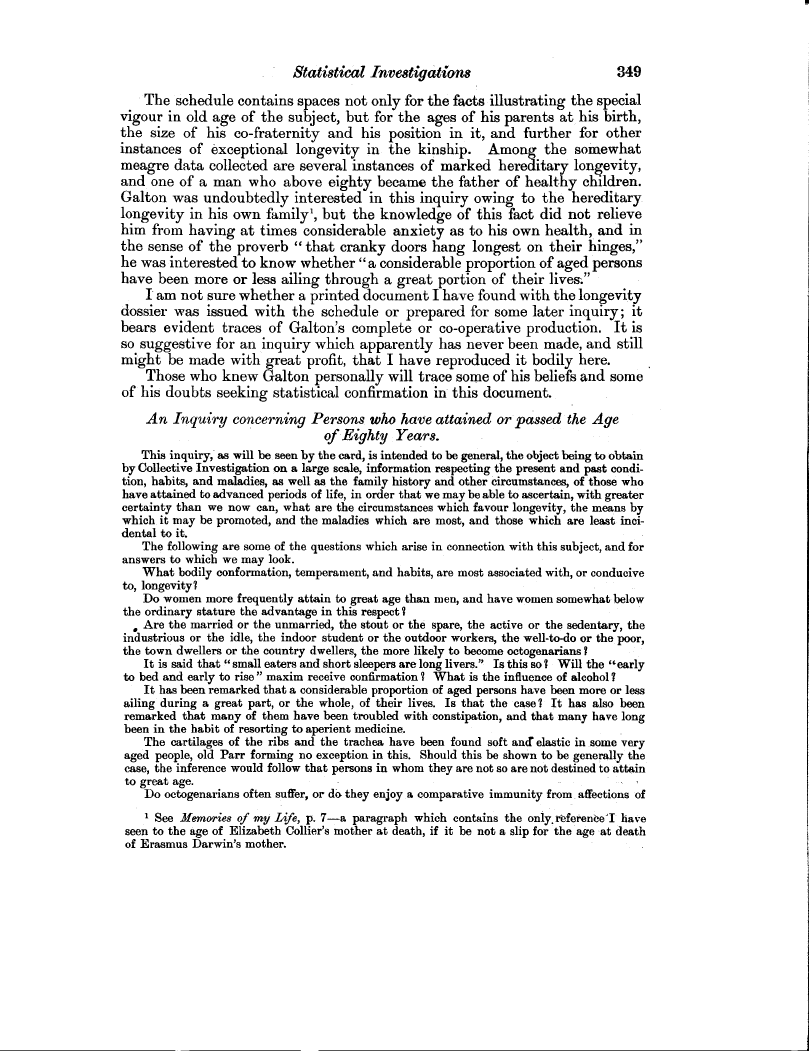Statistical Investigations 349
The schedule contains spaces not only for the facts illustrating the special vigour in old age of the subject, but for the ages of his parents at his birth, the size of his co-fraternity and his position in it, and further for other instances of exceptional longevity in the kinship. Among the somewhat meagre data collected are several instances of marked hereditary longevity, and one of a man who above eighty became the father of healthy children. Galton was undoubtedly interested in this inquiry owing to the hereditary longevity in his own family', but the knowledge of this fact did not relieve him from having at times considerable anxiety as to his own health, and in the sense of the proverb " that cranky doors hang longest on their hinges," he was interested to know whether "a considerable proportion of aged persons have been more or less ailing through a great portion of their lives."
I' am not sure whether a printed document I have found with the longevity dossier was issued with the schedule or prepared for some later inquiry; it bears evident traces of Galton's complete or co-operative production. It is so suggestive for an inquiry which apparently has never been made, and still might be made with great profit, that I have reproduced it bodily here.
Those who knew Galton personally will trace some of his beliefs and some of his doubts seeking statistical confirmation in this document.
An Inquiry concerning Persons who have attained or passed the Age
of Eighty Years.
This inquiry, as will be seen by the card, is intended to be general, the object being to obtain by Collective Investigation on a large scale, information respecting the present and past condition, habits, and maladies, as well as the family history and other circumstances, of those who have attained to advanced periods of life, in order that we may be able to ascertain, with greater certainty than we now can, what are the circumstances which favour longevity, the means by which it may be promoted, and the maladies which are most, and those which are least incidental to it.
The following are some of the questions which arise in connection with this subject, and for answers to which we may look.
What bodily conformation, temperament, and habits, are most associated with, or conducive to, longevity?
Do women more frequently attain to great age than men, and have women somewhat below the ordinary stature the advantage in this respect?
Are the married or the unmarried, the stout or the spare, the active or the sedentary, the industrious or the idle, the indoor student or the outdoor workers, the well-to-do or the poor, the town dwellers or the country dwellers, the more likely to become octogenarians?
It is said that" small eaters and short sleepers are long livers." Is this so? Will the "early to bed and early to rise " maxim receive confirmation? What is the influence of alcohol ?
It has been remarked that a considerable proportion of aged persons have been more or less ailing during a great part, or the whole, of their lives. Is that the case? It has also been remarked that many of them have been troubled with constipation, and that many have long been in the habit of resorting to aperient medicine.
The cartilages of the ribs and the trachea have been found soft and elastic in some very aged people, old Parr forming no exception in this. Should this be shown to be generally the case, the inference would follow that persons in whom they are not so are not destined to attain to great age.
Do octogenarians often suffer, or do they enjoy a comparative immunity from affections of
1 See Memories of my Life, p. 7-a paragraph which contains the only. reference' I- have seen to the age of Elizabeth Collier's mother at death, if it be not a slip for the age at death of Erasmus Darwin's mother.

